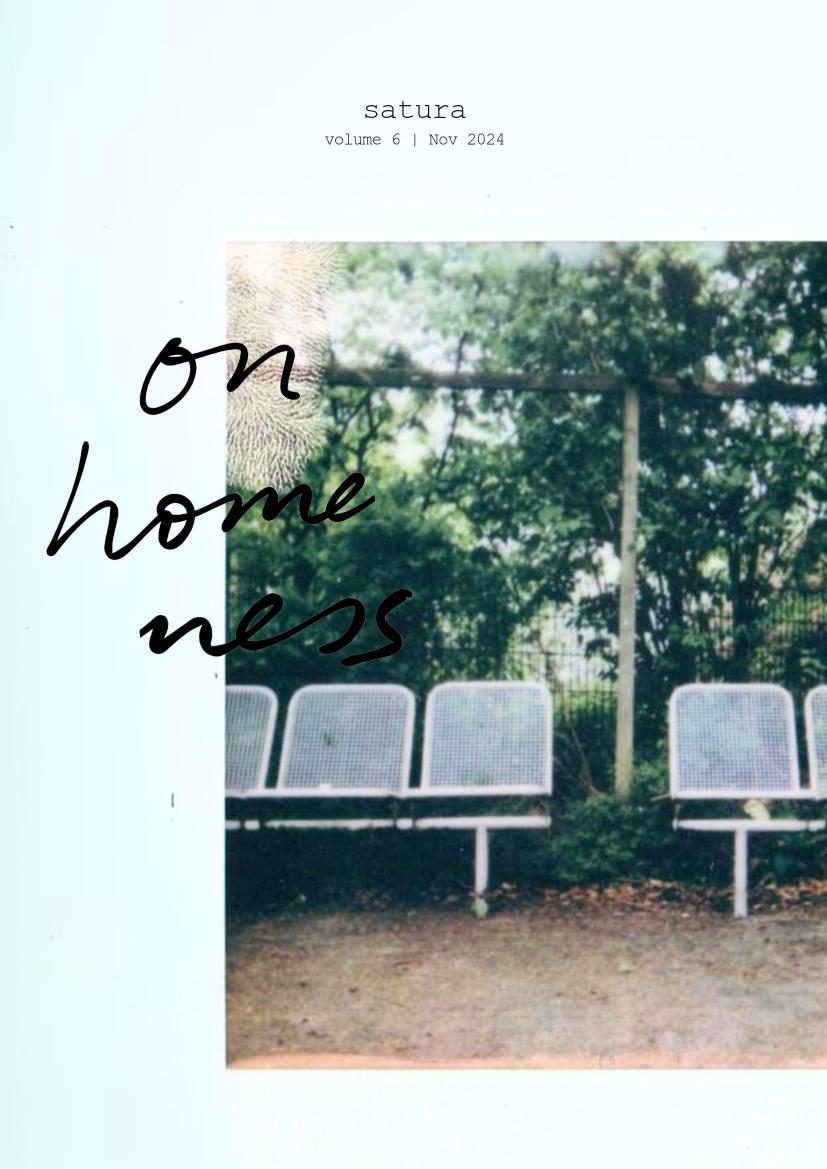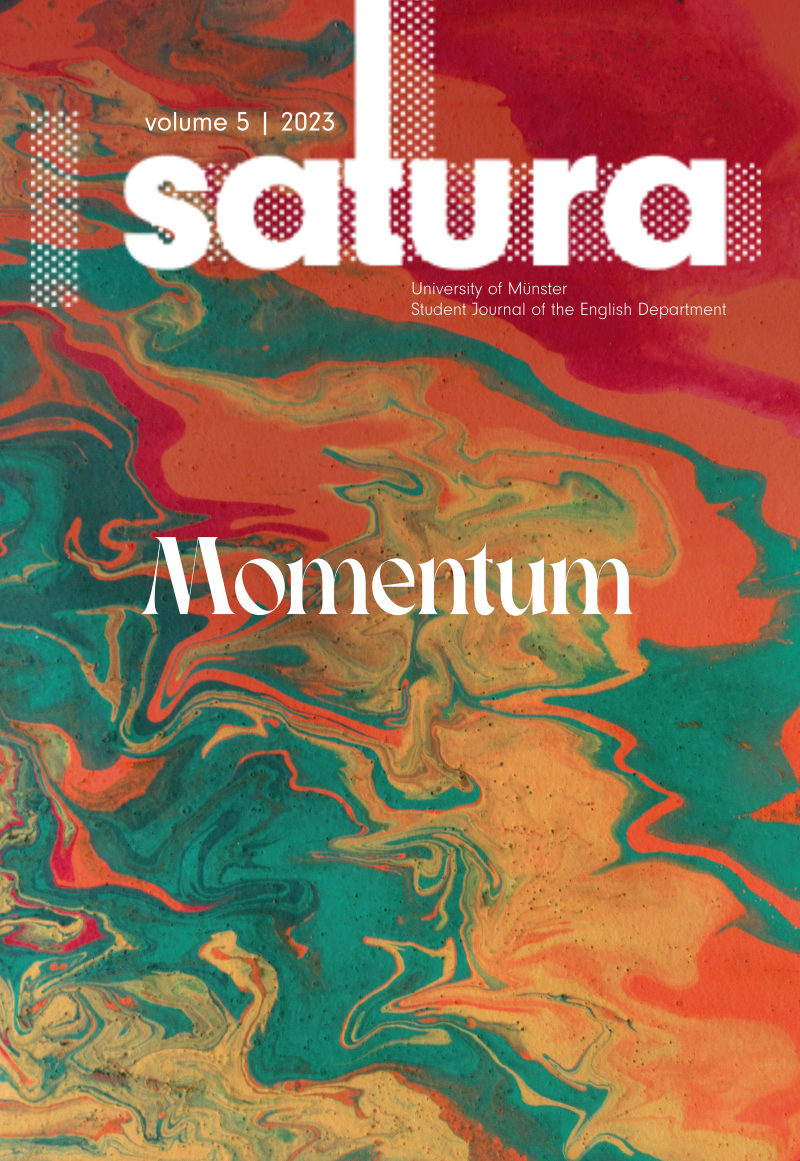Archives
-

On Homeness
Vol. 6 (2024)On Homeness is an attempt to understand the dimensions of our belonging; whether we locate ourselves in regards to conceptions of a deity, an imagined national collective, a hectare of ancestral land, a music playlist, or a dish that accommodates one’s elusive self.. The feeling of homeness can be found in all sorts of unexpected places.
Home, as a solitary designation, implies an emphasis on the physicality of home. Beyond this outdated reality lies a plethora of unexplored emotions.
The neologism 'homeness' suggests exile, pilgrimage, shelter, safety, and beyond.
-

Momentum
Vol. 5 (2023)Volume 5 explores the concept of "Momentum" in creative writing, academic writing, and artwork by students from the University of Münster and around the world. We asked for our contributors to explore direction, movement, force, and power as they observe it in the world.
-

Crucibles of Transition
Vol. 4 (2022)Welcome to the fourth volume of Satura, published in November, 2022.
The theme of this issue – Crucibles of Transition – asked students from around the world to explore how identity, war, gender, disease, climate change, sexuality, class, nationality, language and other forms of difference help us connect and disconnect.
We wanted to bring together student voices to reflect and give us a sense of the world as they see it.
On the cover of this volume, we feature Yara Dampha, who studies international and European governance at the University of Muenster.
-

Vol. 3 (2021)
Work. Quarantine. Play. Pandemic. Study. Isolation. Think.
Transmissions from a pandemic.
-

Vol. 2 (2019)
Welcome to the second issue of the student journal Satura . We are proud to present this collection of articles by students of WWU. Volume 2 features eight articles spanning the fields of anthropology, book history, literary and cultural studies, as well as linguistics and teaching English as a foreign language. This is the first issue to feature an article from the Department of Anthropology (Ethnologie Institut) of our university. The themes of the papers in this volume include a discussion of the importance of teaching critical thinking when using historical films in EFL classrooms; an analysis of the speech patterns of RuPaul’s Drag Race’s contestants; a contemplation on changes in published texts and collation of modern texts; a critique of the representation of mental illness in contemporary US-American TV-shows; a corpus-based analysis of Donald Trump’s 2016 presidential campaign; teaching intercultural communicative competence at Berufskolleg; a discourseabout governmental restrictions and online hashtags that are an important part of an organisationof feminist movement in Germany; and last but not least is an article on Shakespeare that questions>the identities of the monsters in Macbeth and what that tells us about the culture they were borninto.
There is much more in this issue of Satura . We are excited to present the Creative Writing section of the journal this year with a gripping excerpt from the previously unpublished novel Mister Peep - a story of power and violence that men exercise over women in the Nigerian university system and how the roles can be reversed. Also included is the mindful and strong poem Enough, that touches upon the power of words and asks questions that everyone can relate to. And there is Body – a poem that rhythmically examines what is deep inside and on the surface, how it lives with the world outside and the world within.
What do we want when we work on Satura? We are looking for diversity and encouragement. We are a learning and sharing experience. The team of the second issue of our journal has worked hard to bring the academic and creative writing pieces to our readers. We improved our skills and learned from our mistakes. The result of this collaborative work is a stepstone for both the authors and the editorial team. The second issue has the year 2019 on it but it comes to you in 2020 due to the complications in the publication process. We are nonetheless glad to see the work of so many people be shaped into a student-led journal that will become a long-lasting tradition at the English Department. The year 2020 will see another issue of Satura but for now let us read and discuss all the research questions asked last year.
Dylan Hendrix
Natalia Tolstopyat -

Vol. 1 (2018)
Welcome to the first volume of Satura, the student journal of the English Department of the Westfälische Wilhelms-Universität Münster. This issue is the culmination of a ten month labor of love on the part of the Satura team. Our first goal – to bring together articles from a variety of subjects within the English Department – was successfully achieved thanks to the authors who provided us with a broad range of submissions. Our second goal – to offer experience to students in the production of a printed journal – was reached from the moment we got a group of students together to plan the first issue. Finally, our third goal – the finished work you are reading right now – was only met thanks to the dedication of the entire Satura team. It is because they shared our belief in the project that this became possible.
The seed for Satura was planted in January 2018, after a student workshop in cooperation with Universiteit Leiden. As participants, we thought it would have been nice to print a small journal as a compilation of the presentations given at the workshop. Such an edition never came to pass, but the seed had been sown and took root as an idea to print a journal representing the diversity of subjects within the English Department – a journal managed by students for students. Today, we celebrate the bounty of the first harvest.
In an era of fake news, cacophonous discourse, and 280-character debates, the study of the Humanities has become more important than ever. How else do we learn how to form arguments, gain insight from history, and peer into the soul of humankind? How else do we learn to write the words that inform and soothe rather than deceive and obfuscate? Science is important, of course, but if we leave the Humanities behind we lose, for lack of a better word, our humanity. Our vision for the future of Satura – which means mixed dish in Latin – is to encourage discourse from all areas of the Humanities, and listen to what students have to say about their studies and interests. Our aim is to make Satura a long-lasting tradition for the English Department at WWU.
We hope that you, dear reader, enjoy what Satura has to offer. To our staff and supporters we owe unending gratitude, and as always, cookies.
Laura Ntoumanis
Natalia Tolstopyat



